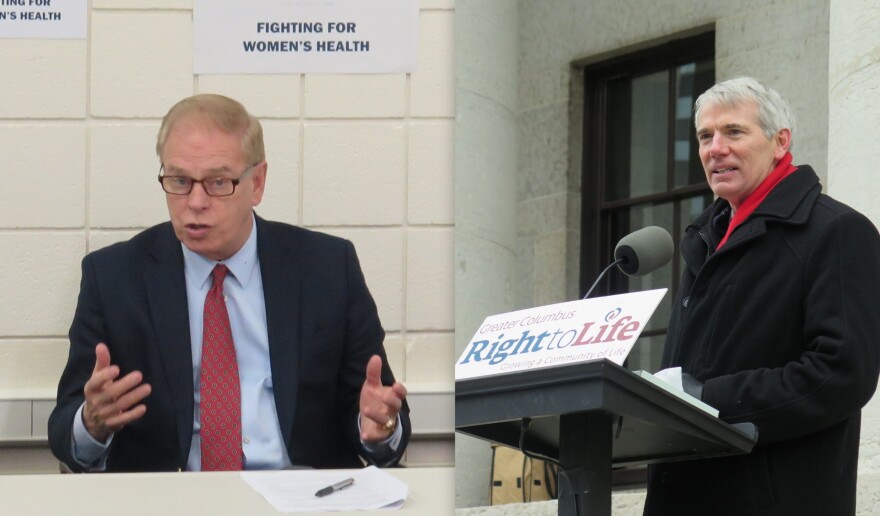Trade is one issue that leaves Republican U.S. Sen. Rob Portman and his Democratic challenger, former Gov. Ted Strickland, trading blows with one another.
Trade has been a top issue in the ads and debates in Ohio's U.S. Senate race. And it’s somewhat ironic that Portman’s view on trade is closer to that of Democratic Presidential nominee Hillary Clinton, and Strickland’s is more like Republican nominee Donald Trump.
NAFTA support with caveats
Portman is the former U.S. trade representative under former President George W. Bush. And when he was in Congress, he voted for the big trade deal for many watching this race, the North American Free Trade Agreement or NAFTA -- a deal Trump calls the worst in history.
“We send 40 percent of our exports from Ohio to NAFTA countries. Most of them go to Canada. So it is a big help to a lot of companies,” he said.
But Portman, like Hillary Clinton, has had a complicated relationship with NAFTA; they’ve supported it, but have acknowledged it has problems. Portman says a lot of Ohio businesses depend on NAFTA. But in a recent debate, Portman described NAFTA as a “mixed bag,” saying he’s working on some of the issues that have come along with it.
“I’ve taken the lead on cracking down on unfair imports. I’m the one who is being tough on China. I’m the one who has taken the lead on passing currency manipulation and actually passing legislation to stop China from dumping steel here,” Portman said.
Portman says the key is updating NAFTA with new provisions.
Consistent opposition
Strickland takes an opposite view .
“I voted against NAFTA. Rob Portman voted for NAFTA. He has cast 14 votes, giving China most favored nation trading status. He calls himself the quarterback who pushed CAFTA over the line. He voted to fast track the TPP. I am on the side of the regular working people. Rob Portman is on the side of the rich and powerful,” Portman said.
Like Donald Trump, Strickland doesn’t want to tinker with existing trade deals. He wants to overhaul them.
And that includes the not-yet-ratified Trans-Pacific Partnership. Portman and Clinton have supported it but now have shifted their positions. Strickland hasn’t gone as far as Trump, who’s called it a disaster, but says there’s too much to fix to make it viable. But Strickland says he can support fair trade deals.
“Fair trade is where you have an agreement where there are worker protections, where there are environmental standards, where child and slave labor isn’t utilized, where workers have the right to organize into a union to bargain for their wages and benefits. If a trade deal comes along that has those kinds of provisions in it, I would hugely be in favor of it," Strickland said.
The playing field
Earlier this year, on the midway at the Ohio State Fair, Portman advocated sweetening NAFTA and all existing trade deals with a piece of legislation he’s sponsoring.
“My legislation called “Level the Playing Field” enables Ohio workers to be able to compete, whether it’s steel workers, or tire workers, or paper workers, whether it’s the construction trades that have been involved in those businesses. They want to be sure that we are cracking down on unfair imports coming in. And I’ve done that. And it’s making a difference for Ohio workers.”
Union endorsements
But that hasn’t won over all of those workers. The Teamsters and United Mine Workers have endorsed Portman, but the United Steelworkers and unions representing paper, glass and aluminum workers have endorsed Strickland. So has the United Auto Workers, which notes Strickland’s support for the bailout for the auto industry, when he was governor. Strickland says Portman didn’t back it.
“He called the auto rescue a lousy deal for Ohio,” Strickland said.
Politifact notes that Portman did call the auto rescue “lousy” but said that he would have supported it had he been in Congress in 2009, when the bill passed and was signed into law.
Strickland popped into a Columbus area campaign office recently, delivering pizza to volunteers, most of whom were probably in diapers when NAFTA was signed back in 1994.
The trade issue isn’t on the top of their minds, but it has certainly been a major focus in the tens of millions of dollars in ads that have aired in Ohio during this Senate race.





